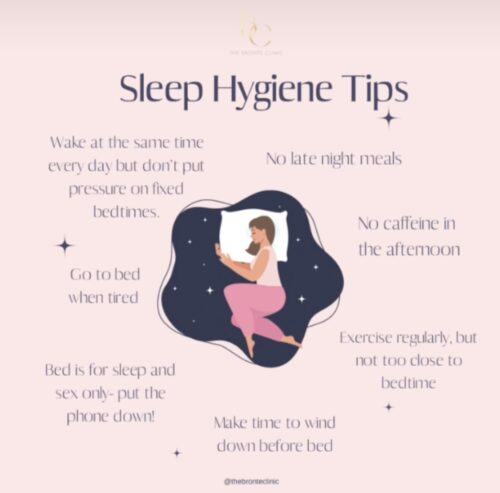Local hero? Farine, Wandsworth
Farine is the latest venture by the coffee gurus behind local chain ‘Press.’ Taking over the premises of what was the ‘Barmouth Kitchen,’ it sits ... Read Feature
It feels somewhat ironic that at a time in our lives when we need to draw on all of our physical and mental energy reserves to take on what life throws at us, when a good night’s sleep is essential for keeping all those plates spinning, that somehow a restful night becomes somewhat elusive.
If you, too, feel that an undisturbed night’s sleep is a thing of the past, and wonder how you will make it through another day of brain fog and fatigue, then you are not alone.
 Recent studies have shown some staggering statistics. On average, 12% of women experience sleep complaints. As women approach their early 40s to early 50s, that number increases dramatically to 40-60%. A recent poll of 2,000 women found nearly ⅔ of those going through the menopause suffered from sleep disturbance, which equates to up to 5 and a half weeks of sleep lost each year. No wonder we all feel so exhausted!
Recent studies have shown some staggering statistics. On average, 12% of women experience sleep complaints. As women approach their early 40s to early 50s, that number increases dramatically to 40-60%. A recent poll of 2,000 women found nearly ⅔ of those going through the menopause suffered from sleep disturbance, which equates to up to 5 and a half weeks of sleep lost each year. No wonder we all feel so exhausted!
So how does the menopause have such an impact on our sleep?
Dr Sam Brown, the Menopause Doctor from The Bronte Clinic explains. “Although we know that sleep can be affected by a multitude of causes, our hormones can play a key role. A reduction in oestrogen levels can lead to heightened anxiety, mood changes, joint aches and pains, leg cramps, palpitations, and needing the toilet, all of which can impact on sleep quality. Alteration in temperature regulation, which plays an important role in our sleep cycles, can instead lead to hot flushes and night sweats. Progesterone can have a sleep inducing effect on the brain, so falling levels in the perimenopause can lead to us having issues with falling or staying asleep. An increase in follicle-stimulating hormone (FSH) has also been found to alter sleep cycle activity too.”
HRT can play a very helpful role in helping to combat these symptoms, in turn improving our sleep. Oestrogen, via a transdermal route, alongside micronised progesterone, has been found in studies to be a particularly effective combination. For those where HRT might be a contraindication or not a preference, low-dose SSRIs could be considered for hot flushes or modest insomnia symptoms. CBT and hypnotherapy can also play a role in these areas too.
As well as looking at the role our hormones might be playing with our sleep issues, it is equally as important to take a look at some of the other compounding factors. We are all living increasingly busy and frenetic lives, and so looking at stress and stress reduction is vital in improving our sleep patterns.

Dani Russell from the Bronte Clinic has a special interest in sleep and appeared recently in the Sunday Times (link). How I learnt to sleep | Luxx Magazine | The Times
She takes a holistic and comprehensive view to get you sleeping well again and explains what is often discussed in her consultations. “Stress reduction- how does this look for you? For some, it might mean regular exercise, yoga, breathing techniques, or mindfulness. For others, it could mean a long hot bath and reading a book. Decide what works for you and try to protect this time in your day to ensure that you are looking after you. It is all too easy for this to fall down the priority list.
Stick to a regular routine for bedtimes and waking- try to avoid the snooze button and aim to get some natural daylight as soon as possible after waking, especially important as we approach the winter months.
Think about having a phone ban in the bedroom and invest in a good old-fashioned alarm clock instead. Screen time before bed is known to affect our circadian rhythms, and there is a temptation to reach for your phone when you wake in the early hours- mindlessly scrolling on Instagram at this time is not conducive to a good night sleep.
Go steady on the caffeine- it is all too easy to reach for the coffee as an energy boost when we are struggling to get through the day, but as a rule try to avoid caffeine past midday- it has a longer half-life in the bloodstream than you think and can still impact on that shut-eye many hours later.
Keep moving! For some just the thought of exercise can be exhausting enough, however, the benefits from this are undeniable, for both sleep and our general mental health and wellbeing, as well as the obvious cardiovascular benefits. But this needn’t be gruelling, time-consuming or expensive. Aiming for short bursts regularly is enough, and can include any sort of movement, whether that is a walk in the park or some energetic housework, make it count and feel good for it! Just make sure you have some energy left for all that plate spinning you still have left to do…”
Hopefully these changes are achievable and go some way in helping you get a good night’s sleep. If you would like to explore HRT options or need help with your sleep, please book an appointment with your GP, or contact The Bronte Clinic for a more in depth discussion to help address your needs.
Reference; https://www.ncbi.nlm.nih.gov/pmc/articles/PMC6092036/
Poll of 2000 women undertaken by Silentnight
Farine is the latest venture by the coffee gurus behind local chain ‘Press.’ Taking over the premises of what was the ‘Barmouth Kitchen,’ it sits ... Read Feature
"This experience expanded my thoughts of our world"Eaton House The Manor takes sustainability very seriously, and beautiful Clapham Common opposite the school offers many ... Read Feature
First visit since recent refurbishment.The Wandle is one of the pubs closest to Earlsfield station. When I first moved to the area it was ... Read Feature